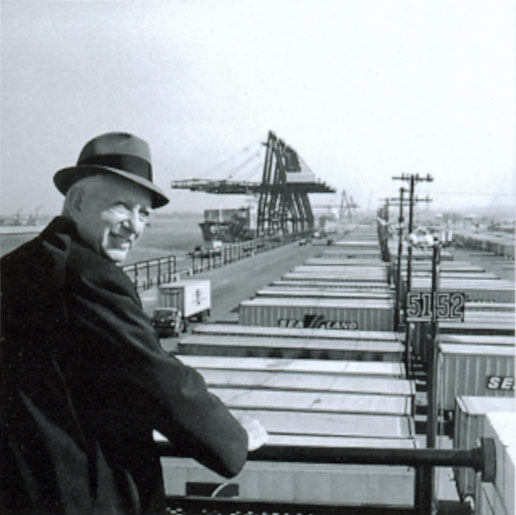Today marks the 17th installment in a series of articles by HumanProgress.org titled, Heroes of Progress. This bi-weekly column provides a short introduction to heroes who have made an extraordinary contribution to the wellbeing of humanity. You can find the 16th part of this series here.
Our 17th Hero of Progress is Malcom McLean, an American truck driver and, later, businessman who developed the modern intermodal shipping container. McLean’s development of standardized shipping containers significantly reduced the cost of transporting cargo across the world. Lower shipping costs significantly boosted international trade which, in turn, helped to lift hundreds of millions of people out of poverty. McLean’s “containerization” remains a vital pillar of our interconnected global economy today.
Before McLean developed the standardized shipping container, nearly all the world’s cargo was transported in a diverse assortment of barrels, boxes, bags, crates and drums. A typical ship in the pre-container era contained as many as 200,000 individual pieces of cargo that were loaded onto the ship by hand. The time it took to load and unload the cargo often equaled the time that the ship needed to sail between ports. That inefficiency contributed to keeping the cost of shipping very high. This is where McLean enters our story.
Malcolm (later Malcom) McLean was born in November 1913 in Maxton, North Carolina. When he graduated from high school in 1935, his family lacked the necessary funds to send him to college. Instead he began working as a driver for his siblings’ trucking company.
In 1937, McLean made a routine delivery of cotton bales to a port in North Carolina for shipment to New Jersey. As McLean couldn’t leave until his cargo had been loaded onto the ship, he sat for hours watching dozens of dock hands load thousands of small packages onto the ship. McLean realized that the current loading process wasted enormous amounts of time and money, and he began to wonder if there could be a more productive alternative.
In 1952, McLean thought of loading entire trucks onboard a ship to be transported along the American Atlantic coast (i.e., from North Carolina to New York). Although this idea would dramatically reduce loading times, he soon realized that these “trailer ships” would not be very efficient due to the large amount of wasted cargo space.
Mclean modified his original design so that just the containers – and not the trucks’ chassis – were loaded onto the ship. He also developed a way for the containers to be stacked on top of one another. That was the origin of the modern-day shipping container.
In 1956, McLean secured a bank loan for $22 million. He used the money to buy two World War II tanker ships and convert them to carry his containers. Later that year, one of his two ships, the SS Ideal-X, was loaded with 58 containers and sailed from New Jersey to Houston, Texas. At the time, McLean’s shipping company offered transport prices that were 25 percent lower than those of his competitor as well as the ability to lock the containers in order to prevent cargo theft, which also appealed to many new customers.
By 1966, McLean launched his first transatlantic service and three years later, McLean had started a transpacific shipping line. As the advantages of McLean’s container system became clear, bigger ships, more sophisticated containers and larger cranes to load cargo were developed.
In 1969, McLean sold his first shipping company for $530 million ($3.8 billion in today’s money) and went on to start a string of other business ventures. Most notably, he purchased the shipping company United States Lines in 1978 and built a fleet of 4,400 container ships. McLean continued to refine his shipping containers for the rest of his life. He died at the age of 87 in Manhattan in 2001. When he died, Forbes Magazine called McLean “one of the few men who changed the world.”

In 1956, hand-loading loose cargo onto a ship in a U.S. port cost $5.86 per ton ($65.50 in 2023 money). However, thanks to McLean’s new containers, the price reduced to just 16 cents per ton ($1.79 in 2023). HumanProgress’ Board Member Matt Ridley has noted that “the development of containerization in the 1950s made the loading and unloading of ships roughly twenty-times as fast and thereby dramatically lowered the cost of trade.”
This dramatic reduction in shipping costs boosted international trade. That means that consumers now have access to goods from around the world at a price lower than was previously thought possible. Similarly, reduced shipping costs have helped to boost the living standards of hundreds of millions of people in export-oriented developing countries over the last few decades.
Without McLean’s containers, global trade would be far below the level that it is today, and nearly all of us would be less well-off. It is for these reasons that Malcom McLean is our 17th Hero of Progress.

